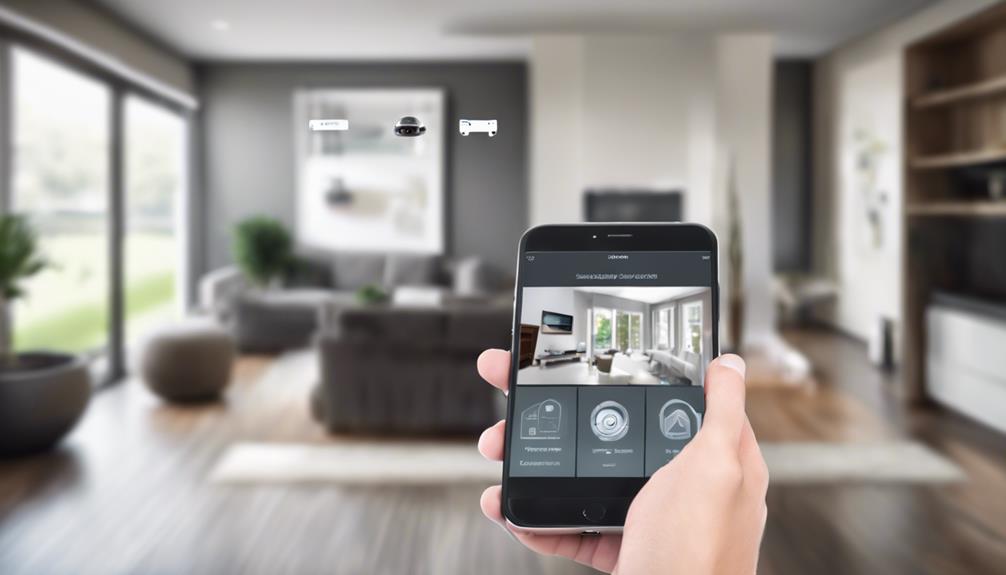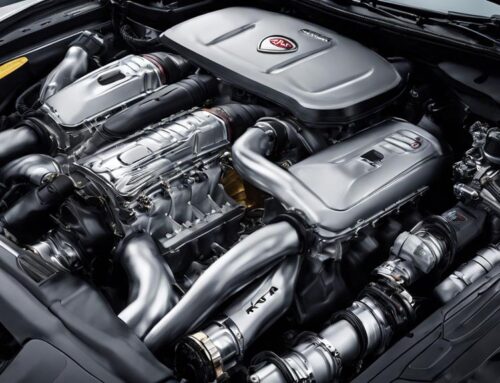When deciding between smart home security systems and traditional ones, it boils down to your specific needs. Smart systems allow remote control through smartphone apps, offer wireless installation options, personalized notifications, and integration with other smart devices. On the flip side, traditional systems are renowned for their reliable detection methods and established technology. They might suit you better if you value proven methods and effectiveness. Each system has its pros and cons depending on factors like installation, costs, and functionality. Tailoring your choice to what matters most to you will guarantee the best protection for your home.
Key Takeaways
- Smart systems offer remote monitoring, immediate alerts, and integration with smart devices.
- Traditional systems provide reliable detection but lack advanced features like remote control and notifications.
- Installation costs are lower for smart systems, with DIY options available, while traditional systems require professional installation.
- Smart systems are user-friendly with mobile app integration, offering convenience and accessibility.
- Smart systems incorporate modern technology for advanced security functions, providing real-time threat alerts and notifications.
Key Differences Between Security Systems
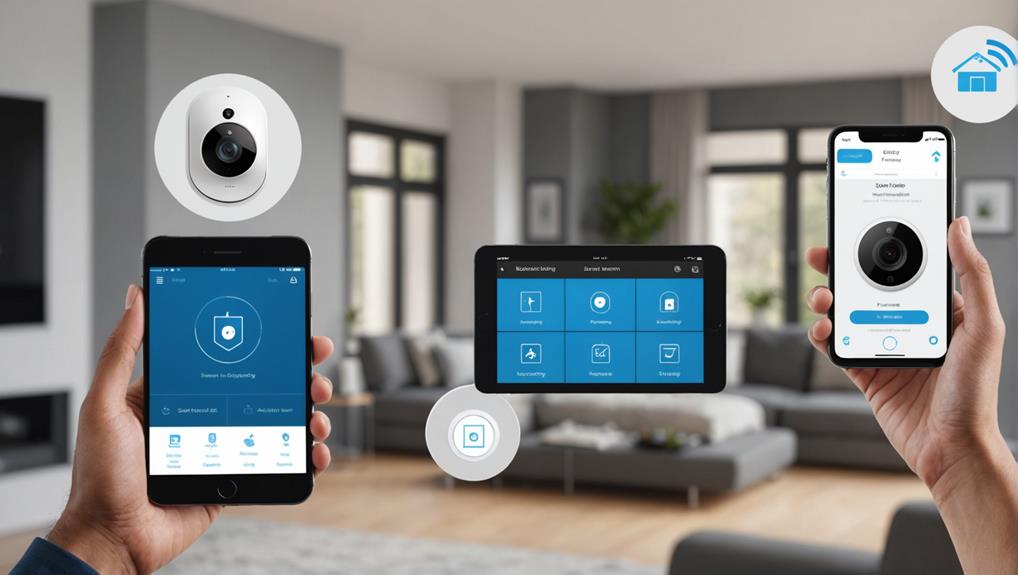
Curious about the distinctions between smart home security systems and traditional ones? Smart home security systems offer remote monitoring and control through user-friendly smartphone apps, while traditional systems rely on manual operation with limited remote access.
Unlike traditional systems that often need professional installation due to wired connections, smart systems can be easily set up wirelessly, providing more installation flexibility. When choosing devices and integrating them, it's important to evaluate how each system fits your lifestyle and home setup.
One significant difference lies in the alerts they provide. Smart systems offer immediate notifications specifying which sensor was triggered, whereas traditional systems typically sound alarms without detailed information.
Additionally, smart systems excel in integration capabilities, allowing for interconnectivity with other smart devices like cameras and locks. In contrast, traditional systems function independently with limited integration options.
Moreover, smart systems are adaptable, enabling automatic updates and customization based on user behavior, while traditional systems necessitate manual setup and maintenance.
Assess these differences when choosing between smart home and traditional security systems for your home's safety and convenience.
Pros and Cons of Each System
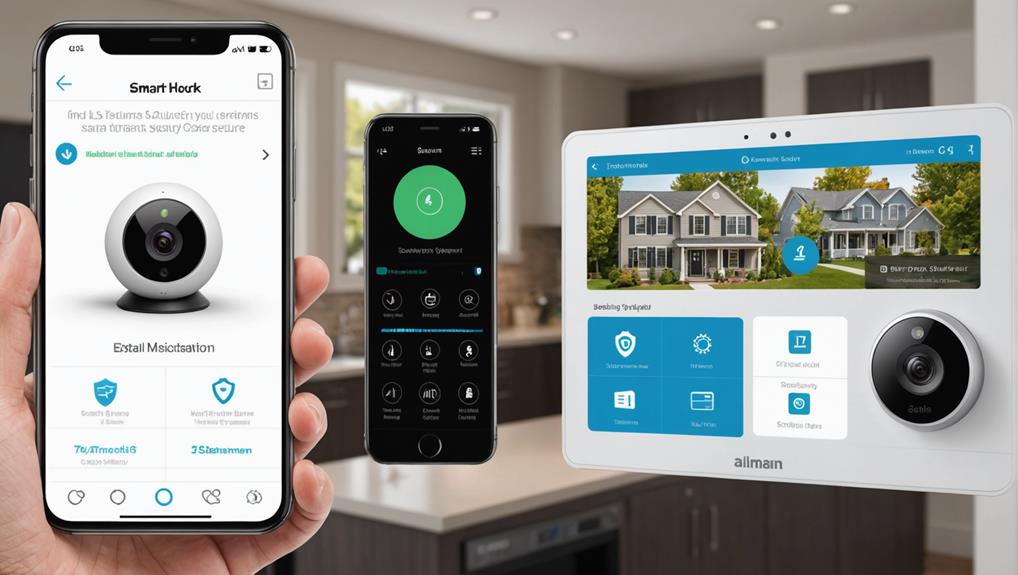
When comparing smart home security systems and traditional systems, each type offers distinct advantages and drawbacks. Traditional systems are known for their reliable detection methods and established technology, making them a dependable choice for homeowners. However, they've limited connectivity and higher installation costs.
On the other hand, smart home security systems provide enhanced features like remote monitoring and customizable alerts through smartphone apps, greatly enhancing the user experience. Additionally, smart systems often come with the option for DIY installation, which can save both time and money compared to professional setups.
While traditional systems may have lower initial complexity, they often require professional installation, increasing upfront costs. Smart systems, on the other hand, can be self-installed, reducing both costs and time.
Smart systems also allow integration with various smart devices for thorough protection and automation, while traditional systems operate independently with limited integration capabilities.
Both types have ongoing costs, with traditional systems averaging $20 to $60 for monitoring fees and smart systems offering self-monitoring options that can reduce fees to as low as $10 per month.
Reliability and Functionality Comparison
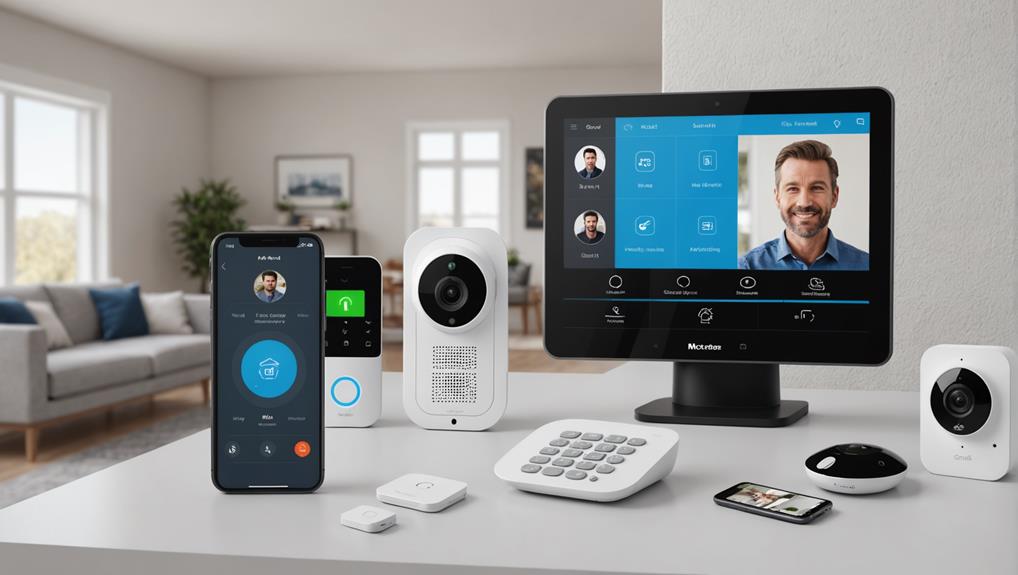
Concerning reliability and functionality, both traditional security systems and smart home security systems offer unique advantages to homeowners.
Traditional home security systems are renowned for their high reliability, utilizing hardwired components that guarantee consistent performance and reduce the risk of technical failures. These wired components provide a stable connection that's less susceptible to signal interference or hacking attempts compared to wireless systems.
On the other hand, smart home security systems enhance functionality by providing remote monitoring and control through smartphones, enabling users to oversee their home security from anywhere with an internet connection.
The Electronic Security Association (ESA) highlights the effectiveness of traditional alarms in reducing burglaries by up to 60%, emphasizing their reliability in deterring crime.
Conversely, smart systems excel in immediate notifications and real-time alerts on security events, allowing for swift assessments and faster response times compared to traditional systems that often depend on delayed manual monitoring.
While upgrading traditional systems can be complex and expensive, smart systems offer user-friendly maintenance and easy integration of new components, making them more adaptable to evolving security needs.
Choosing the Right Security System
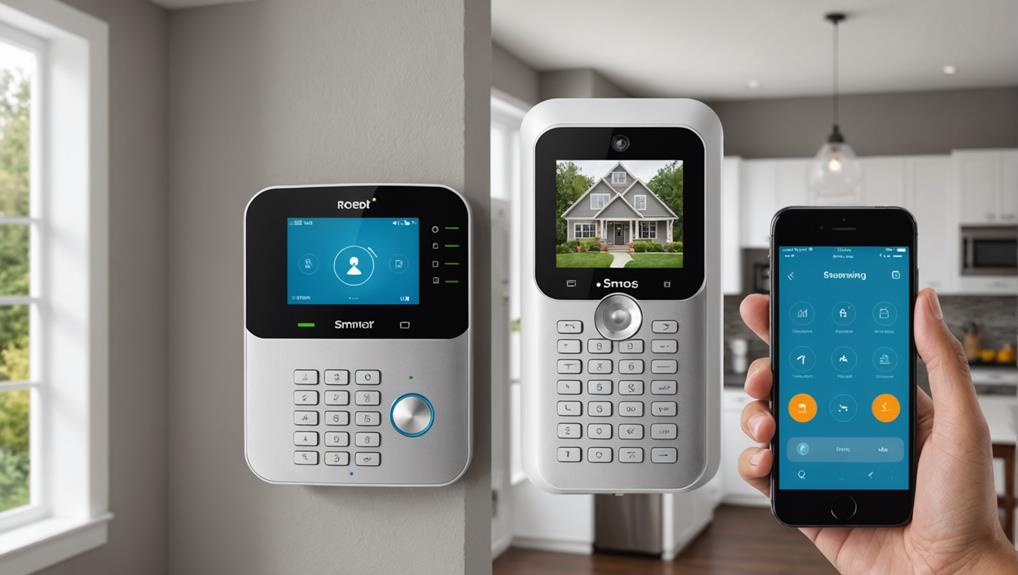
Assessing the unique strengths and features of both traditional and smart home security systems, the decision-making process to choose the right security system becomes vital for homeowners. When making this choice, it's important to weigh the benefits of smart security systems, such as convenience and remote access, against the reliability of traditional systems in deterring burglaries.
To assist you in making an informed decision, here is a comparison table outlining key factors to evaluate:
| Factors to Evaluate | Traditional Security Systems | Smart Security Systems |
|---|---|---|
| Installation | Professional installation, costs $500-$1500 | DIY installation, starting at $200 |
| Ongoing Costs | Monthly monitoring fees $20-$60 | Self-monitoring options as low as $10 |
| Integration Capabilities | Standalone nature | Connect with various smart devices |
| Monitoring Preferences | Professional or self-monitoring options | Often no long-term contracts for monitoring |
Alerts and Monitoring Methods
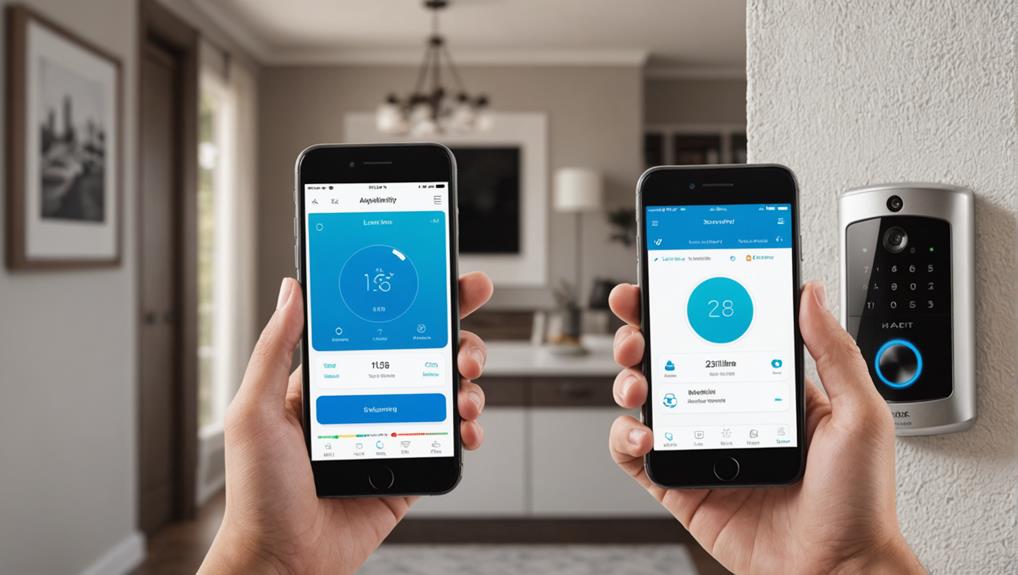
For homeowners seeking heightened security measures, the domain of alerts and monitoring methods distinguishes smart home security systems from traditional counterparts.
Smart systems immediately alert your smartphone upon activation, specifying the triggered sensor, whereas traditional systems rely on loud sirens with limited notifications. Smart technology can integrate with traditional home alarms to enhance security and convenience.
While traditional alarms offer basic audible alerts and 24/7 monitoring, smart systems use motion and sound detectors for proactive alerts and live viewing. Real-time monitoring and instant threat assessment through live video feeds are exclusive to smart systems, lacking in traditional setups.
Smart notifications even include two-way communication to interact with visitors or intruders, a feature absent in traditional systems. Additionally, smart systems offer cloud storage for automatic event recording, providing a thorough history of security incidents, unlike traditional systems.
When it comes to alerts and monitoring, smart home security systems clearly outshine their traditional counterparts.
Installation and Customization Options
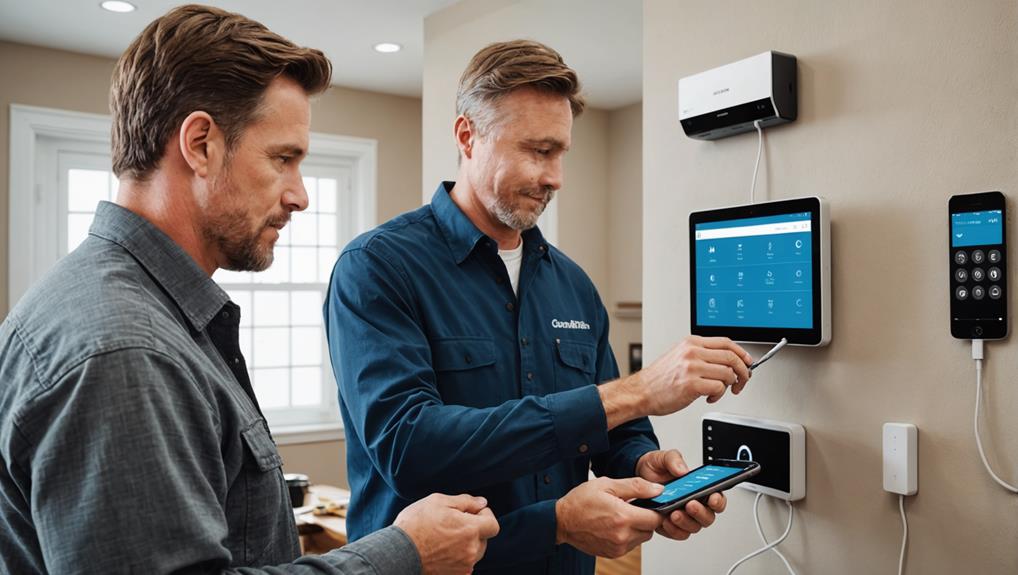
When it comes to installing and customizing your home security system, the differences between smart systems and traditional alarms are stark.
Modern smart home security systems offer DIY installation options, saving you time and money compared to the professional installation needed for traditional systems. With smart systems, you have the flexibility to customize your security settings, choose specific alerts, and integrate various smart devices to suit your needs.
Additionally, opting for a smart system can provide significant savings on long-term expenses, as highlighted in cost insights comparing DIY and professional installations. In contrast, traditional systems provide limited customization focused on basic security functions, lacking the modern conveniences of smart technology.
The installation process for smart systems is often quick, taking just a few hours for wireless models, while traditional wired systems can be more complex and time-consuming.
Additionally, smart systems come with user-friendly mobile apps for easy remote monitoring and adjustments, a feature not commonly found in traditional systems.
With smart systems, you have the advantage of scalable customization, allowing you to easily add or modify devices as your security requirements evolve, while traditional systems may require professional assistance for upgrades or additions.
Frequently Asked Questions
What Type of Security System Is the Best?
When deciding on the best security system for you, consider your needs and preferences.
Think about factors like cost, ease of use, and desired features. Do some research to compare options and see what aligns most with what you're looking for.
Take into account factors like upfront costs, ongoing monitoring fees, and the level of automation you desire.
It's crucial to find a system that meets your security needs while fitting your budget and lifestyle.
Are Smart Home Security Systems Worth It?
Smart home security systems are worth it for their affordability, enhanced features, and customizable options.
They offer remote monitoring, immediate alerts, and integration with various devices for extensive security.
Smart systems also provide quicker response times and lower ongoing costs compared to traditional systems.
With benefits like these, investing in a smart home security system can provide peace of mind and better protection for your home.
What Is the Best Do It Yourself Home Security System?
When it comes to finding the best do-it-yourself home security system, you should consider options like Ring Alarm and SimpliSafe.
These systems offer easy installation without needing professional help, allowing you to set up your security quickly.
Starting at around $200, these DIY systems are budget-friendly and can be customized with features like cameras and smart locks to suit your needs.
Look for integration with other smart devices for added convenience.
Is Hardwired Security Better Than Wireless?
Hardwired security systems offer more reliability and stability due to their wired connections, making them less susceptible to interference. They don't rely on Wi-Fi or cellular signals like wireless systems.
Installation may need professional help and take longer, but long-term maintenance costs are lower without battery changes.
Wireless systems allow flexible device placement, but may be easier to hack if not secured.
Ultimately, the choice between hardwired and wireless depends on your priorities.
Conclusion
Ultimately, when deciding between a smart home security system and a traditional system, it all comes down to your individual needs and preferences. While smart systems offer convenience and advanced technology, traditional systems may provide a more reliable and straightforward approach. Consider factors such as monitoring options, installation ease, and customization capabilities to determine which system aligns best with your home security goals. Make an informed choice that brings peace of mind and protection to your household.

